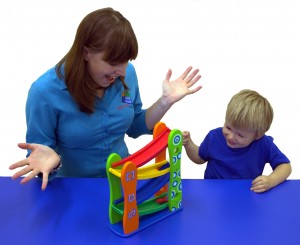
We have looked in previous posts at how to help young children develop more single words. When children have developed a set of around 20 to 50 single words they begin to combine these together to express new more specific meanings such as “bye Dad”, “Mum car” and “more drink”. In typically developing children this begins at around 18 months and is well established by 2 years. Try these strategies and activities to help your child develop this stage which is a stepping stone to speaking in sentences.
What is a two word combination?
Young children use words a little differently to adults. Adults consider phrases such as “all gone” and “see you” two words, however young children tend to use them as if they are a single word. They use them in the same way each time to express the same meaning. They don’t tend to say “all over” or “lucky you” in the way an adult can combine these words in different ways, so really they don’t count in the child’s mind as two separate words put together. True two word combinations begin when the child takes two words they use alone and puts them together such as “hi Mum” or “hi Nana”. They might also take a word they know and add a new word to it such as “more banana” and “more swing”.
Two word combinations can include:
-
Person + object "Alex shoe"
-
Person + action "Alex jump"
-
Action + person "kiss Nana"
-
Action + object "kick ball"
-
Description + object "big ball"
-
Object + description "ball gone"
-
Questions “Where’s Dad?

To help your child develop two word combinations:
1. Build a solid base of single words. Children usually need around 50 single words before they begin this stage. Even after they begin to use two words they will need to continue to learn more single words to continue to develop their language skills. It is usually easier to learn a new word as a single word at this stage e.g. “zebra” then later combine it “baby zebra” “zebra eating” etc. Click here to download ideas and activities for developing single words.
2. Develop a variety of word types. Children begin by learning lots of names of people and things. To develop two word combinations they often need to combine these nouns with a different type of word such as an action word or a descriptive word. Action words are particularly important as they form the basis of sentences later on. Click here to download some printable activities for developing early vocabulary.
Help your child learn a range of different words including:
-
action words: eat, sleep, jump, dance, run;
-
describing words: big, funny, sad, hot, wet;
-
position words; up, in, under,
-
possessive words: mine, yours,
-
greeting words: hi, bye,
-
functional words: more, gone, no,
3. Expand the single words your child does say by adding another word. Try to repeat it a couple of times if you can.
Sometimes you might add another word you know they can say e.g. Child “bye” Adult “bye Dad, Dad’s going shopping, bye Dad”. Sometimes you might add a new word. Child “more” Adult “toast, more toast, you like the toast, more toast.”
Your child does not need to copy you, just hearing what you say will help and they will use that phrase when they are ready. If they do try to copy you though, respond positively. If what they say is not clear still be positive and say it again clearly for them. E.g. child “more toat” Adult “yes more toast”.

4. Practice games and activities where you can repeat the same word or two words over and over a number of times.
Activities could include:
-
Bathtime: wash + body part “wash face, wash arms, wash tummy”
-
Mealtime: eat + food name “eat peas, eat carrots, eat meat”
-
Dressing: clothing name + on “shirt on, pants on, socks on, hat on”
-
Ball play: action + ball “roll ball, push ball, kick ball, catch ball”
-
Car play: car + action/position “ car go, car stop, car up, car in, car down”
-
Block play "build up, more blocks, fall down"
-
Outside play "Alex + run/jump/climb/slide" "Alex under/over/in/out/through"
-
Hiding dolls or animals and finding them “hello teddy, goodbye puppy”.
-
Matching games “Two apples, more dog”
Click here to download information on developing speech and language through play.
When your child does produce two words together all by themselves expand them to a single sentence to keep them learning.
If you have concerns about your child's speech or language skills the Talking Matters website has information about these skills and checklists to see how your child is developing for their age. We provide individualised assessments and therapy for children with speech, language and learning difficulties and other disabilities. Our aim is to help parents help their child reach their potential. See how we can help or contact a speech pathologist in your local area.
Related Blog Posts
If you liked this post you may also like:
Looking after Mum
Verbs and conjunctions
50 ready to read ideas
All about Language



